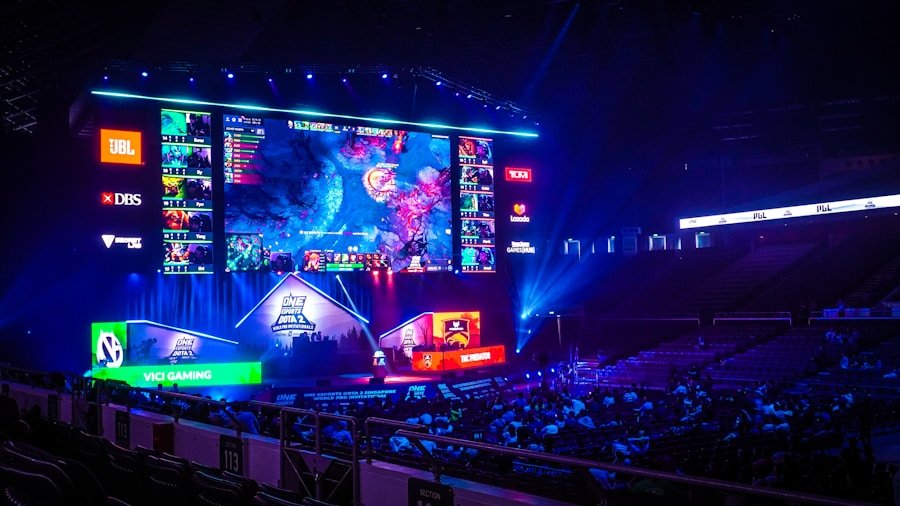Now Reading: Esports: The Latest News and Updates
-
01
Esports: The Latest News and Updates
Esports: The Latest News and Updates

The world of esports has witnessed an unprecedented surge in growth and popularity over the past decade. As I reflect on this evolution, it’s clear that what began as a niche hobby for a select group of gamers has transformed into a global phenomenon. The rise of streaming platforms like Twitch and YouTube Gaming has played a pivotal role in this transformation, allowing millions of fans to watch their favorite players and teams compete in real-time.
I find it fascinating how these platforms have not only provided a stage for professional gamers but have also fostered a sense of community among fans, creating a vibrant ecosystem where everyone can engage with the content. Moreover, the demographic of esports fans is incredibly diverse, spanning various age groups and backgrounds. I often marvel at how traditional sports fans are increasingly drawn to esports, attracted by the fast-paced action and strategic depth that many games offer.
This crossover appeal has led to significant investments from major corporations and sports franchises, further legitimizing esports as a competitive arena. As I delve deeper into this world, I can’t help but feel excited about the future of esports, especially as it continues to break down barriers and reach new audiences across the globe.
Key Takeaways
- Esports continues to experience rapid growth and increasing popularity worldwide.
- Major tournaments and events draw in large audiences and offer substantial prize pools.
- New game releases and updates drive excitement and engagement within the esports community.
- Team transfers and roster changes are common occurrences and can significantly impact team dynamics.
- Sponsorship deals and partnerships play a crucial role in the financial success of esports organizations.
Major Tournaments and Events
The Cultural Significance of Esports Events
Events like The International for Dota 2 and the League of Legends World Championship have become cultural touchstones, drawing in massive audiences both online and in-person. I remember watching these tournaments unfold, feeling the palpable excitement in the air as teams battled for glory and substantial prize pools.
A New Standard of Production Quality
The production quality of these events has also reached new heights, rivaling that of traditional sports broadcasts. I am often amazed by the elaborate stages, high-definition graphics, and expert commentary that enhance the viewing experience.
More Than Just Competitions
These tournaments have become more than just competitions; they are grand spectacles that captivate millions. As I follow these events, I appreciate how they not only highlight individual skill but also emphasize teamwork and strategy, showcasing the depth of talent within the esports community.
New Game Releases and Updates

The landscape of esports is constantly evolving, largely due to the continuous influx of new game releases and updates. As a passionate gamer myself, I eagerly anticipate each new title that promises to shake up the competitive scene. Games like Valorant and Apex Legends have quickly gained traction, attracting both players and viewers alike.
I find it intriguing how developers are increasingly focusing on creating balanced gameplay and engaging mechanics that cater to both casual players and competitive gamers. Updates to existing games also play a crucial role in maintaining interest within the community. Regular patches, new characters, and seasonal events keep the gameplay fresh and exciting.
I often find myself diving back into my favorite titles after an update, eager to explore new strategies and tactics that emerge from these changes. The dynamic nature of game development ensures that there is always something new to discover, which keeps me engaged and invested in the esports scene.
Team Transfers and Roster Changes
In the world of esports, team transfers and roster changes are as common as they are impactful. As I follow my favorite teams, I often find myself analyzing how these shifts can alter the dynamics of a squad. The decision to bring in a new player or let go of an existing one can be a double-edged sword; it can either propel a team to new heights or lead to unforeseen challenges.
I remember when some high-profile players switched teams, creating a buzz within the community as fans speculated about how these changes would affect their performance. These roster changes are not just about individual talent; they also reflect broader trends within the industry. Teams are constantly seeking ways to optimize their performance, whether through strategic acquisitions or by fostering synergy among players.
As I observe these developments, I appreciate how they mirror the fluid nature of competitive gaming itself—always adapting, evolving, and striving for excellence.
Sponsorship Deals and Partnerships
Sponsorship deals and partnerships have become integral to the growth of esports, providing teams and organizations with the financial backing needed to thrive in this competitive landscape. As I delve into this aspect of the industry, I am struck by how brands are increasingly recognizing the value of associating themselves with esports. Major companies from various sectors—ranging from technology to energy drinks—are investing heavily in sponsorships, which not only support teams but also help elevate the entire ecosystem.
These partnerships often lead to innovative marketing strategies that engage fans in unique ways. I’ve seen brands create interactive experiences at live events or launch campaigns that resonate with the gaming community. This synergy between esports organizations and sponsors is mutually beneficial; while teams gain financial support, brands tap into a passionate audience eager to connect with their products.
As I witness this evolution, I can’t help but feel optimistic about the future of esports sponsorships and their potential to drive further growth.
Player Interviews and Profiles

One of my favorite aspects of following esports is getting to know the players behind the screens through interviews and profiles. These glimpses into their lives reveal not only their gaming prowess but also their personalities, struggles, and triumphs. As I read about their journeys—from humble beginnings to becoming household names—I feel a deeper connection to them as individuals rather than just competitors on a screen.
Player interviews often highlight their dedication to their craft, showcasing the countless hours spent honing their skills. I admire their resilience in facing challenges, whether it’s dealing with pressure during high-stakes matches or overcoming personal obstacles. These stories inspire me and many others in the community, reminding us that behind every victory lies hard work and determination.
Esports Industry News
Staying updated with esports industry news is essential for anyone passionate about this dynamic field. As I navigate through various news outlets and social media platforms, I am constantly amazed by how quickly developments unfold—whether it’s a groundbreaking partnership announcement or a major game update. The rapid pace at which information spreads keeps me engaged and informed about what’s happening in the world of esports.
I find it particularly interesting how industry news often reflects broader trends within gaming culture. For instance, discussions around player mental health have gained prominence in recent years, prompting organizations to prioritize well-being alongside performance. As I read articles addressing these issues, I appreciate how they contribute to a more holistic understanding of what it means to be an esports athlete today.
The ongoing dialogue surrounding industry news not only keeps me informed but also fosters a sense of community among fans who share similar interests.
Esports Community and Fan Engagement
The esports community is one of the most vibrant and passionate groups I’ve ever encountered. As I immerse myself in this world, I am continually impressed by how fans engage with each other and with their favorite teams and players. Online forums, social media platforms, and fan events create spaces where we can share our thoughts, celebrate victories, and commiserate over losses together.
This sense of belonging is something truly special; it’s as if we’re all part of one big family united by our love for gaming. Fan engagement has evolved significantly over the years, with many organizations actively seeking ways to connect with their audience.
As someone who enjoys being part of this community, I appreciate these efforts; they make me feel valued as a fan and deepen my connection to the esports scene. The enthusiasm and camaraderie within this community continue to inspire me as we collectively celebrate our shared passion for competitive gaming.
Did you hear about the latest Esports news? According to a recent article on Gamers.co, the Esports industry is booming with new tournaments and competitions being announced regularly. In addition, if you’re looking to stay updated on the top mobile games of 2025, be sure to check out their article on the ultimate picks. And if you’re in the market for a new gaming console, Gamers.co also has a helpful guide on making the right choice. Stay informed and up to date with all things gaming by visiting Gamers.co today!
FAQs
What is esports?
Esports, short for electronic sports, refers to competitive video gaming. Players and teams compete in various video games, often in organized leagues and tournaments, for prize money and recognition.
What kind of games are played in esports?
Esports encompasses a wide variety of video games, including popular titles such as League of Legends, Dota 2, Counter-Strike: Global Offensive, Overwatch, and many others. These games can be played on various platforms, including PC, console, and mobile devices.
How popular is esports?
Esports has experienced significant growth in popularity in recent years, with a global audience that includes both casual viewers and dedicated fans. Major esports events can attract millions of viewers and offer substantial prize pools.
What are some of the biggest esports tournaments and leagues?
Some of the biggest and most prestigious esports tournaments and leagues include The International for Dota 2, the League of Legends World Championship, the Overwatch League, and the Intel Extreme Masters series for various games.
How do esports players and teams make money?
Esports players and teams can earn money through a variety of avenues, including tournament winnings, sponsorships, endorsements, streaming revenue, and salaries from professional organizations.
What is the future of esports?
The future of esports is bright, with continued growth expected in terms of audience size, prize pools, and mainstream recognition. Esports is also likely to further integrate with traditional sports and entertainment industries.














![Photo Crafting guide [game name]](https://gamers.co/wp-content/uploads/2025/04/image-417.jpg)










